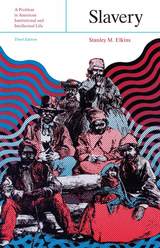Over the past 20 years, Berlin's work has redefined how scholars approach the study of slavery and freedom in America. His scholarship on slavery and race...and his complete command of the enormous literature on slavery now come together to inform this compelling history. Here Berlin carefully delineates the ways slavery varied according to time and place and compare slavery in the Americas, mapping the migrations of peoples from Africa to America and then across the South in its various incarnations, discovering within slave life the roots of African American religions, family, folkways, foodways, crafts, and more. His book reminds us that the generations after emancipation still resonated with the culture of those once held in captivity. Essential.
-- Randall M. Miller Library Journal
Eminent historian Berlin revisits and extends by a century the territory of his honored and groundbreaking Many Thousands Gone...Berlin recapitulates the argument of his earlier, prize-winning work, delineating "the making and remaking of slavery" as a matter of "Generations"...While preserving the terrible complexity and diversity of North American slavery, Berlin offers a compact scholarly account of the transformation of a society with slaves into a slave society. He reveals without condescension or simplification the inspiring social structures that arose from a horrific history...This book follows up with grace and determination.
-- Publishers Weekly
Ira Berlin has written what will undoubtedly become one of the indispensable books on North American slavery. Generations of Captivity traces the history of this dismal institution from its 17th-century origins to its 19th-century destruction in the maelstrom of civil war. He comes closer than any other contemporary historian to giving us an opportunity—in a single, readable volume—to come to grips with a subject very few of us wish to think about but which all of us surely need to consider: how millions of white Americans over the course of three centuries came to hold millions of black Americans in chattel bondage while managing to lose nary a moment's sleep over their complicity in this monstrous enterprise...Berlin has given us a moving, insightful account of slavery in the United States. Readers will not soon forget the story he has told, nor should they. We still live with the consequences of this institution, and we should understand what slavery meant to the generations of captivity who lived it.
-- Charles B. Dew New York Times Book Review
Although American slavery is generally thought of as dominating and being dominated by the culture, politics, and economics of the South, Berlin charts the dynamic quality of American slavery by placing it into the changing context of American history and various generations overall. The experience of the original settlement population adapting to their new environment produced what Berlin calls the chartered generation. Most often associated with slavery is plantation life and the plantation generation, which reflected the western and southern expansion of the nation as cotton became king of the economy. Following the plantation generation was the revolutionary generation, when worldwide views on slavery and freedom influenced domestic politics and culture. Berlin reflects on the contrasts between the southern experience of slavery and the North's experience and challenges with its freedmen.
-- Vernon Ford Booklist
Berlin focuses on change over time as it affected patterns of African American demography, family and community life, religious beliefs and practices, and labor in the field and workshop. In the process, he illuminates the rich complexity of slavery as it was shaped by various colonial powers (Spanish, French, British) in port cities and in rural areas...This compact volume offers an impressive overview of historic transformations and regional variations in the institution.
-- Jacqueline Jones Washington Post
Berlin's insightful scholarship demonstrates that U.S. slavery was a complex, constantly changing institution that differed a great deal over time and place. This new work summarizes the rich history presented in the author's brilliant Many Thousands Gone and extends the account to the Civil War and emancipation.
-- R. Detweiler Choice
Where Generations of Captivity differs from previous histories is in its emphatically bottom-up approach, looking at slavery almost exclusively from the point of view of the slaves themselves, and in its relentless emphasis on the institution's cruelty.
-- Howard Temperley Times Literary Supplement
Ira Berlin, in his Generations of Captivity: A History of African-American Slaves, shows that the Northern states, despite having gradually emancipated their own slaves between the Revolution and the 1830s, were deeply implicated in the protection and preservation of slavery in the South. Northern free blacks agitated vigorously for the freedom of their brethren in bondage, but the discrimination and violence to which they were exposed in the North left them for the most part disenfranchised, impoverished, and (especially after the Fugitive Slave Act of 1850) unsure whether they could maintain their own freedom against slave catchers and kidnappers.
-- George M. Frederickson New York Review of Books
Ira Berlin's exhaustive study of slavery...presents countless challenging conclusions that will spawn further debate about the peculiar institution.
-- Dallas Morning News
Over the years, Ira Berlin has established himself as one of the foremost scholars of North American slavery. His last book, Many Thousands Gone (1998), was concerned with the first two centuries of slavery in the United States. Generations of Captivity covers a lot of the same territory, but in doing so takes the story up to the American Civil War (1861-5) and beyond. The result is an absorbing work that demonstrates convincingly that slavery was not a static or monolithic structure but an evolving institution that changed dramatically between the eighteenth and nineteenth centuries
As one might expect, Berlin pieces together this complex history with great skill and authority. He rarely falters and, just as important, contrives to makes the vast literature on North American slavery vital and accessible. Generations of Captivity is more than a work of synthesis, however. By incorporating the nineteenth century slave experience, not the wider history of Atlantic slavery, Berlin has added immeasurably to our understanding of the "peculiar institution", as well as our understanding of antebellum America.
-- J. R. Oldfield History
This new study allows Berlin to make a close reading of the explosive scholarship about black life and slavery in the past five or so years...Berlin's configuration of the first half of the nineteenth century as the "migration generations" fuses together the saga of western development, the internal slave trade, the Underground Railroad, and the transformation of northern states from societies with slaves to freedom grounds...Mine is but a partial recounting of the complexity and thoroughness of Berlin's superb scholarly reach. This is the best synthesis and predominant interpretation of the ensnared histories of African American life and slavery.
-- Russell Gao Hodges Pennsylvania Magazine of History and Biography
In Generations of Captivity, Ira Berlin synthesizes the vast body of recent scholarship on the history of North American slavery into a concise and colorful text. Generations of Captivity resembles Berlin's earlier overview of American slavery, Many Thousands Gone: The First Two Centuries of Slavery in North America (1998), but it covers more chronological ground in fewer pages and more clearly targets a popular audience. The central theme of Berlin's work is that American slavery was an institution that changed over time...Generations of Captivity provides a sophisticated, yet readable, overview of the history of American slavery for general readers. It would be a suitable book for an undergraduate survey of American history or a specialized course on the history of slavery—or for a long-time student of American slavery who is groping for synthesis. Three tables provide valuable data about the slave and free-black population of the American colonies and United States (by state and region) from 1680 to 1860, and extensive footnotes provide recommendations for further reading.
-- Darcy R. Fryer South Carolina Historical Magazine
Generations of Captivity presents a novel way of conceptualising the long spread of slavery in America, and the ways in which Africans and African-Americans adjusted to slavery and how they too were shaped by the institution. The book identifies five "generations" of Africans and their descendants as they coped with societal shifts taking place around them as their world came into brutal contact with White Europeans.
-- Larry Hudson English Historical Review
Ira Berlin charges to the aid of all who labor to demonstrate that slavery entailed meaningful change across three evolutionary centuries. Generations of Captivity offers a reflective synthesis and broad narrative. Moving fluidly, the author navigates the current of historical transition from one era to another and one region to another. Throughout, Berlin has crafted a trenchant review of the salient elements of African-American enslavement...This award-winning sequel to Many Thousands Gone is an admirable compliment to the author’s sweeping overview of slavery in America. It further solidifies Ira Berlin’s secure standing as one of the generation’s preeminent scholars on the topic.
-- Gary T. Edwards H-Net Online
The history of slavery in the United States can be divided into five parts, writes esteemed historian Ira Berlin. He labels them “generations,” namely charter generations, plantation generations, revolutionary generations, migration generations, and freedom generations. Berlin emphasizes changes in the slaves themselves and in the institution of slavery from one generation to the next...This is an excellent survey of the history of slavery for family historians, especially those who specialize in African American research.
-- Christopher A. Nordmann National Genealogical Society Quarterly






























